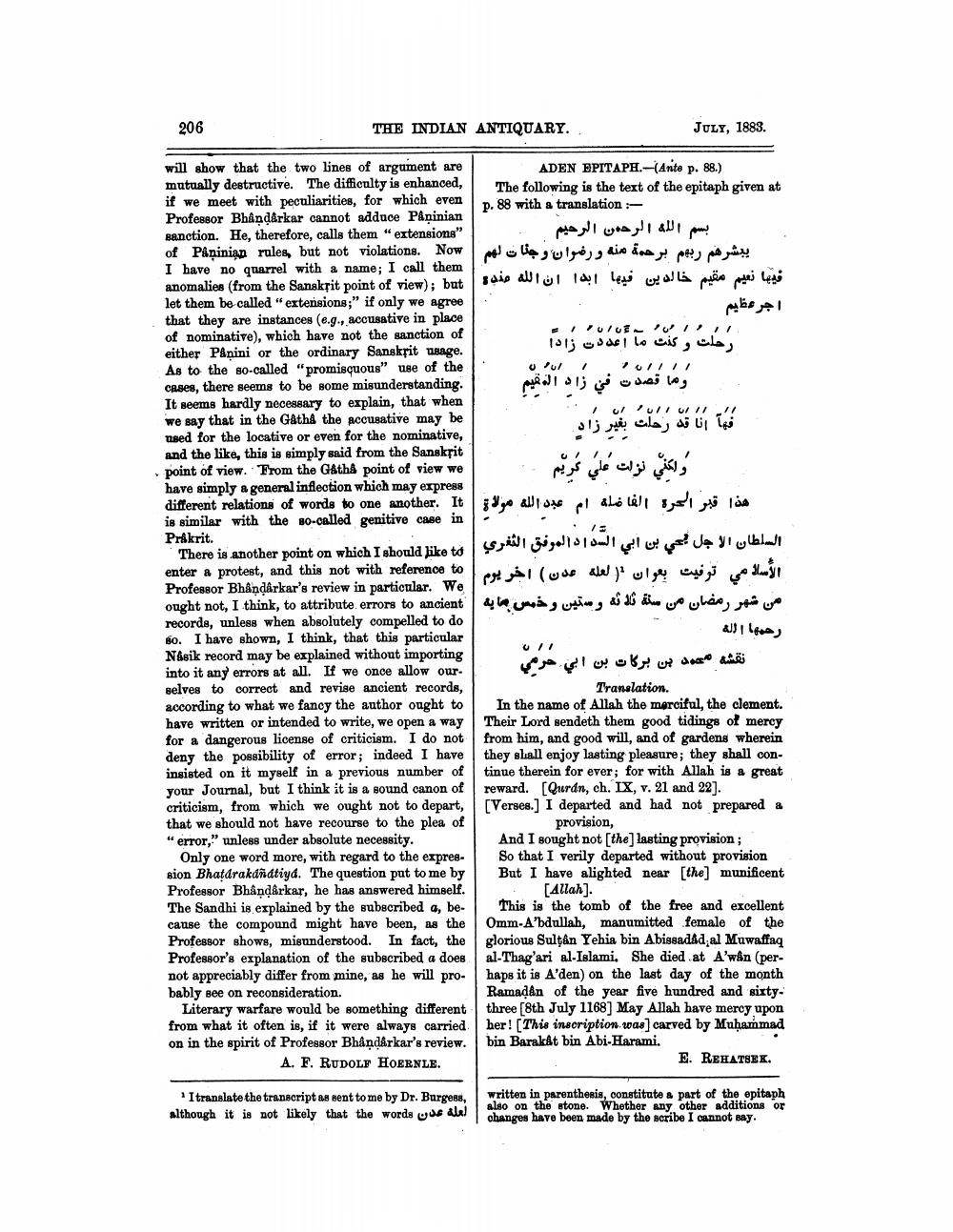________________
206
THE INDIAN ANTIQUARY.
JULY, 1883.
will show that the two lines of argument are mutually destructive. The difficulty is enhanced, if we meet with peculiarities, for which even Professor Bhandarkar cannot adduce Paņinian sanction. He, therefore, calls them "extensions"
ADEN EPITAPH.- Anite p. 88.) The following is the text of the epitaph given at p. 88 with a translation -
مof Panini
بسم الله الرحمن الرحيم يبشرهم ربهم برحمة منه و رضوان و جنات لهم | rules but not violations. Now فيها نعيم مقيم خالدين فيها ابدا ان الله عنده اجرعظيم
رحلت و كنت ما اعددت زادا
وما قصدت في زاد القيم
I have no quarrel with a name; I call them anomalies (from the Sanskrit point of view); but let them be called "extensions;" if only we agree that they are instances (e.g., accusative in place of nominative), which have not the sanction of either Panini or the ordinary Sanskrit usage. As to the so-called "promiscuous" use of the cases, there seems to be some misunderstanding. It seems hardly necessary to explain, that when we say that in the Gatha the accusative may be used for the locative or even for the nominative, and the like, this is simply said from the Sanskpit point of view. From the Gath point of view we have simply a general inflection which may express different relations of words to one another. It is similar with the so-called genitive case in Prakrit.
There is another point on which I should like to enter a protest, and this not with reference to Professor Bhandarkar's review in particular. We
ovat cestu
ولكني نزلت علي كريم
58 go all sxe pl ako kill soljs i de
all Bugallo. Sme si cele mai Jo yl Colle
بعوان ( لعله عدن ) اخر يوم الأسد مي توفيت
ما یه | ought not, I think, to attribute errors to ancient من شهر رمضان من سلة ند ته وستين وخمس رحمها الله
نقشه محمد بن بركات بن ابي حري
records, unless when absolutely compelled to do 60. I have shown, I think, that this particular Nasik record may be explained without importing into it any errors at all. If we onoe allow our selves to correct and revise ancient records, according to what we fancy the author ought to have written or intended to write, we open a way for a dangerous license of criticism. I do not deny the possibility of error; indeed I have insisted on it myself in a previous number of your Journal, but I think it is a sound canon of criticism, from which we ought not to depart, that we should not have recourse to the plea of "error," unless under absolute necessity.
Only one word more, with regard to the expres. sion Bhatdrakdñdtiya. The question put to me by Professor Bhandarkar, he has answered himself. The Sandhi is explained by the subscribed a, because the compound might have been, as the Professor shows, misunderstood. In fact, the Professor's explanation of the subscribed a does not appreciably differ from mine, as he will probably see on reconsideration.
Literary warfare would be something different from what it often is, if it were always carried on in the spirit of Professor Bhåndárkar's review.
A. F. RUDOLF HOERNLE.
Translation. In the name of Allah the merciful, the clement. Their Lord sendeth them good tidings of mercy from him, and good will, and of gardens wherein they shall enjoy lasting pleasure; they shall continue therein for ever; for with Allah is a great reward. [Quran, ch. IX, v. 21 and 22). [Verses.] I departed and had not prepared a
provision, And I sought not (the) lasting provision; So that I verily departed without provision But I have alighted near [the] munificent
(Allah). This is the tomb of the free and excellent Omm-Abdullah, manumitted female of the glorious Sultan Yehia bin Abissadad al Muwaffaq al-Thag'ari al-Islami. She died at A'wên (perhaps it is A'den) on the last day of the month Ramadan of the year five hundred and sixtythree (8th July 1168) May Allah have mercy upon her! [This inscription was carved by Muhammad bin Barakat bin Abi-Harami.
E. REHATSEK.
* Itranslate the transcript as sent to me by Dr. Burgess, although it is not likely that the words ou a
written in parenthesis, constitute & part of the epitaph also on the stone. Whether any other additions or changes have been made by the scribe I cannot say.




